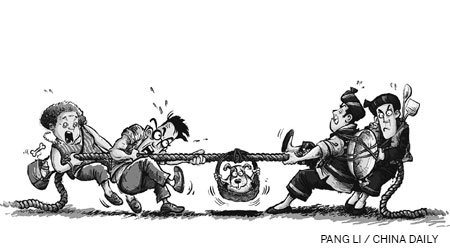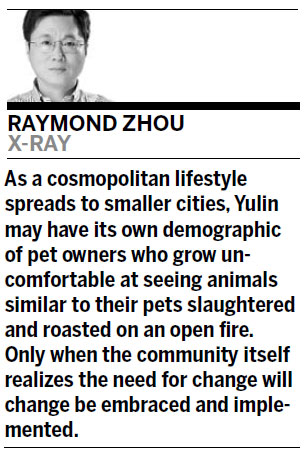The other kind of hotdog
Updated: 2013-08-12 14:35
By Raymond Zhou (China Daily)
|
||||||||


Culinary cultures vary greatly even within one country. What is acceptable in one community could be gravely offensive to another. Building consensus may be futile, but mutual respect could be attained by taking a step away from confrontation, writes Raymond Zhou.
In the heat of summer, most people want to cool off. But not those in Yulin. Residents of this city of six million in the Guangxi Zhuang autonomous region prefer to counter heat with heat. They celebrate the hottest day of the year by eating dog meat, which, in traditional Chinese thinking, is supposed to generate "heat".
News of this local holiday has been generating another kind of heat - protests from pet lovers and animal rights defenders.
Locals seem surprised and puzzled that their favorite pastime would be interpreted as cruelty to animals. For them, dogs are a source of meat and, on this particular occasion, a source of collective fete. The complete name for the festival is "Dog meat and lychee festival", and lychee is a fruit that allegedly has "hot" attributes as well. People of Yulin are obviously proud of their defiance against the sweltering weather.
There are many places across China where consumption of dog meat is taken for granted for the flavor or for supposed health benefits. Most do not have a designated occasion and it is usually in winter cold when the bacchanalian activities take place. Only in the southern city of Yulin, it seems, is the custom enshrined with a certain official sanctity.
Photos and videos of rows and rows of roasted "whole" dogs surfaced online and received two types of responses: licking of lips or the breaking of hearts. Many see no difference between treating dogs in the same category as hogs, cattle and chicken. And it doesn't prevent some of them from keeping pets. "It's something we've been doing for thousands of years," some pointed out, "and why should we change it because foreigners don't like it?"
It is not Westerners but Chinese pet lovers who have been crying foul and organizing boycotts against what they perceive as organized killing of innocent animals. Granted, many of them hail from big cities along the coast where dog eating is not something to be flaunted.
The past decade has seen an awakening of animal rights movements facilitated by the Internet. Truckloads of stray dogs presumably on their way to termination have been sighted and stopped and eventually adopted by those who could not see a cruel fate befalling little animals.
Photos of extracting gall bladders from live bears have shocked some celebrities into taking a stand against such practices. Bear bile is used in traditional Chinese medicine as an ingredient. And sports superstar Yao Ming openly launched a campaign against the consumption of shark's fin, a major cause for slaughtering sharks.
While many people like to frame the controversy as East versus West in gastronomical customs, it goes much deeper than that. As a middle class burgeons in China, the role of pets has evolved. When I was a child, we kept a cat or a dog mainly to finish up the leftovers so that not an iota of food would be wasted and dogs to keep burglars at bay. Sure, they could be fun, but few treated them as equal to us humans.
Pet as friend is a concept that is not only new, but a corollary of growing affluence. In an age of subsistence, the scope of edibles was infinitely larger. Beggars cannot be choosers, and when you are starving, the burden of feeding one more mouth could be so much more daunting and the temptation of turning it into a source of food is so much greater.
When urban women first started calling their pets "my baby", it was seen more or less as a joke. But the relationship between human and pet has been shifting to the point that more and more people begin to see the pet as a friend rather than a potential item on the dinner table. Western influence may have affected their outlook, but the determining factor is probably economic, not cultural.
Again, it is economic consideration that will eventually change the customs and habits like dog eating. I'm not implying cities like Yulin are economically deprived, but they surely have fewer people bothered by this age-old custom.
Say, if Yulin morphs into a tourist mecca with millions of visitors from Beijing, Shanghai and overseas, would they be willing to give up their culinary delight? Rationally, they'll weigh the options: Do we want to offend these big-city spenders by hanging out roasted dogs as if they were roasted ducks, or do we want to be sensitive to our biggest source of income?
My guess is they'd probably drive it underground and away from the curious eyes of the tourists.
A complete phase-out will take a change in mindset. It is very difficult to argue on the premise of animal rights alone. If dogs must not be eaten, what about pigs and turkeys? Unless one is a strict vegetarian, one may run into counter arguments that cannot be easily brushed away.
Using Western custom as a paragon has more pitfalls. Why should we look up to other countries for standards in food choice? For healthy eating, one culture may be ahead of another; but for ethical eating, it is all relative. One culture may deem one animal taboo while another holds a different animal as sacred and still another one requires religious rites to be performed when slaughtering the animal. Nobody can claim absolute moral superiority or exemption from controversy.
Political correctness dictates we respect other cultures while searching for the lowest common denominator. When CNN released a top 10 list of "the most disgusting food", some Chinese lodged complaints because the preserved egg, a Chinese staple, made the list. I looked at the other entries and, judging from the photo illustrations, I would not touch them unless I was on the brink of starvation.
It is clearly a case of where you stand. As I'm Chinese and grew up eating preserved eggs, I do not find them revolting at all. But Americans may well get sick eating them, either from a feeling of nausea or from an easily upset stomach, just as I may encounter the same consuming the other nine entries, most of which are Asian. Had the CNN article been re-titled "10 foods that may upset Americans", there would be nothing wrong. The CNN writer was essentially surveying food from an office in Atlanta, forgetting that its media presence is now all over the world.
That said, we should have the freedom to debate what is or is not appropriate to put on the plate. Even within China, culinary cultures differ from place to place. Cantonese are often criticized for eating "anything that moves" on the ground as some of these animals are endangered species or because butchering them may push certain viruses from animals to humans. Mutual respect does not preclude sensible discussions.
Back to Yulin and its dog-eating festival. It's unlikely locals will soon sacrifice their meat choice because of outside pressure. But they should consider toning down publicity for the event now that they are aware that their delight may be offensive to others.
As a cosmopolitan lifestyle spreads to smaller cities, Yulin may have its own demographic of pet owners who grow uncomfortable at seeing animals similar to their pets slaughtered and roasted on an open fire. Only when the community itself realizes the need for change will change be embraced and implemented.
Contact the writer at raymondzhou@chinadaily.com.cn.
(China Daily USA 08/12/2013 page9)

 Questioning China's achievements
Questioning China's achievements
 Celebrating Chinese Valentine's Day
Celebrating Chinese Valentine's Day
 Spanish skyscraper forgets elevator
Spanish skyscraper forgets elevator
 Beijing rainstorm cancels flights, kills airport worker
Beijing rainstorm cancels flights, kills airport worker
 Highs and lows of marine rescue
Highs and lows of marine rescue
 Lin Dan wins Olympic final rematch over injured Lee
Lin Dan wins Olympic final rematch over injured Lee
 Northeast China braces for major floods
Northeast China braces for major floods
 High-heeled, well heeled
High-heeled, well heeled
Most Viewed
Editor's Picks

|

|

|

|

|

|
Today's Top News
6,007 probed for duty dereliction
Fonterra gets further hit as it recalls milk powder
Chinese take a shine to fine china from UK
New green policy gives industries a big boost
Snowden's father to leave for Russia
Northeast China braces for major floods
Launches highlight India's ambitions
Chinese put on alert in Afghanistan
US Weekly

|

|





